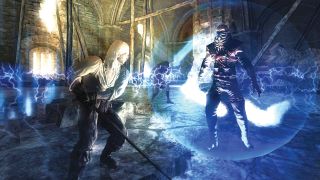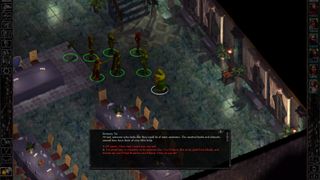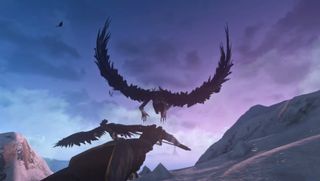How CD Projekt Red climbed to the top of the RPG mountain, then slipped
From D&D imports to redefining the fantasy RPG entirely.

This article first appeared in PC Gamer magazine issue 366 in February 2022, as part of our 'DNA Tracing' series, where every month we delve into the lineages behind iconic games and studios.
CD Projekt Red is a phenomenon that could only have occurred in Poland—and only, really, in the '90s. It's a time that explains more than the studio's ludicrously anachronistic title. This was not just the golden age of the CD-ROM, but the golden age of piracy too—at least in the former Eastern Bloc. Under communist rule, without legitimate access to Western retailers or any copyright law to speak of, Polish PC gaming culture grew in the street markets, where games were sold for £3 a pop—according to the excellent reporting of Eurogamer's resident Witcher scholar, Robert Purchese.
As the iron curtain lifted, local companies—including a pair of skinny young hopefuls named Marcin Iwi ski and Michał Kicinski—could finally, legally import and sell the biggest games from around the world. But in doing so they would have to compete with the Captain Kidds and Calico Jacks who had thrived in their stead.
For its vanguard release, the nascent CD Projekt picked BioWare's Baldur's Gate. In its favour was the fact that it came on five discs, reducing the ability of pirates to sell it cheaply. And since it was an RPG, it was built around words, which CD Projekt could translate in full—casting renowned local actors in some of the key roles.
Rounding out the value proposition was every luxury you could dream of in a big box PC game at the time: a parchment map, an audio CD, and a D&D rulebook. Despite the low-price competition, sales were stellar, and CD Projekt learned its founding principle—to overdeliver.
Bald debut

Baldur's Gate gave CD Projekt more than its first sales success, of course. It gave the company a blueprint for its own development efforts. During that localisation process, it had internalised the Sword Coast's iron ore crises and dark omens; the way Baldur's Gate blends social and economic problems with matters of the gods and asks you to sort through the mess. The Witcher took five years and more funding than the business strictly had to finish, but BioWare's influence was clear to see in the result.
CD Projekt knew Greg Zeschuk and Ray Muzyka well enough to license the Aurora engine, and the two doctors even lent their Polish cousins a corner of their booth at E3. (Make no mistake, BioWare got behind The Witcher; I first saw Geralt when a dramatic piece of art appeared in the launcher for Neverwinter Nights, a space otherwise reserved purely for that game's expansions and DLC.)
With the benefit of half a decade's visual and atmospheric advancements, CD Projekt put Neverwinter Nights' tech to more powerful use than BioWare could have. Pulling the once-isometric camera close to Geralt's shoulder, it situated players among the filth and flora of Vizima. And there was something worth zooming in for: though The Witcher had its share of jank, it also possessed unusual flair for its genre.
The biggest gaming news, reviews and hardware deals
Keep up to date with the most important stories and the best deals, as picked by the PC Gamer team.
Since the shift to 3D, Western RPG fans had resigned themselves to stiff animations and clunky conversations—the trade-offs for scale and reactivity. Yet somehow, despite its lack of pedigree and staff of former bankers and doctors, CD Projekt upped the standard. None of its peers could offer the sight of a pirouetting Geralt severing a drowner's head from its dank blue shoulders—leaving the monster to ragdoll down an embankment into the rain-pounded river from whence it came.
Lesser evils

Even when BioWare put out Dragon Age: Origins two years later—its own spiritual sequel to the D&D games of the '90s—it failed to match The Witcher for its sense of danger in the wilderness, a trait Baldur's Gate had exemplified a decade before. It was the first time CD Projekt had out-BioWare'd its mentors, and wouldn't be the last.
Just look at the Grey Wardens. In retrospect, Dragon Age's warrior order is a clear echo of Geralt's: a gaggle of lonely monster hunters, maligned by wider society, subjected to a strange cocktail during training that kills off most initiates and leaves just a handful of elite mutants. Then there are its elves, an impoverished subclass eking out an existence in the margins of a dominant human civilisation. BioWare was shooting for a darker D&D that now reads like The Witcher with the licence number scratched off; CD Projekt, by contrast, had the advantage of working from source material that was already worshipped in Eastern Europe.
Andrzej Sapkowski's stories had begun as comically twisted fairy tales but become part of the canon of Polish fantasy—a world clawed at by ghouls and strigas, for a country with more than its fair share of ghosts after occupation during the Second World War. By 2007, videogame culture was perfectly poised for fiction that sneered at the self-aggrandisement of knights and met supposed saintliness with suspicion. After Fable and Knights of the Old Republic, RPG fans were ready to be plunged into the fog of the morally grey.
Ker-punk

It wouldn't be true to say that CD Projekt matched Sapkowski for wit or winding plotlines straight away—that first game most often comes off as faithful imitation, ripping common themes and quotes about lesser evils straight from the books. But over two sequels, the studio has proven its talent for adaptation, even capturing the will-they-won't-they-kill-each-other romantic entanglement of Geralt and the witch Yennefer.
Like Sapkowski's originals, CD Projekt's stories are brilliantly soapy—a home to sentimentalism, screaming melodrama, and hot baths. The developer dressed the bed which Netflix now rolls around in, luxuriating in worldwide acclaim for anything Witcher-related.
With each successive Witcher game, CD Projekt reinforced its rule of overdelivering—putting out free enhanced editions many months after release at great expense, long before service games made such additions the norm. It built a reputation for generosity you can now see mimicked by another ascendent RPG developer, Larian.
Cyberpunk should have been the perfect next project—another long-established licence from another medium, stuffed with peculiarities for CD Projekt to nail in its unfailingly reverent way. Yet in the years of anticipation that preceded Cyberpunk 2077's release, the studio sold the world on an impossible combination of The Witcher, Deus Ex, and GTA.
With expectations set to an all-time industry high, the studio failed to live up to its promises for the first time—and in front of the largest crowd. CD Projekt will return to greatness, quite possibly with The Witcher 4. But as the studio licks its wounds, you suspect it will never again forget its first principle: to overdeliver. And, just as crucially, to underpromise.
Most Popular

